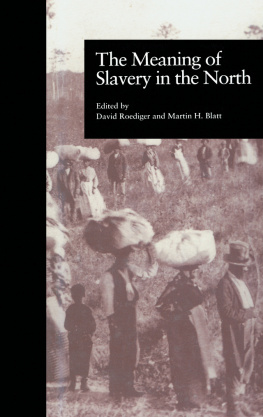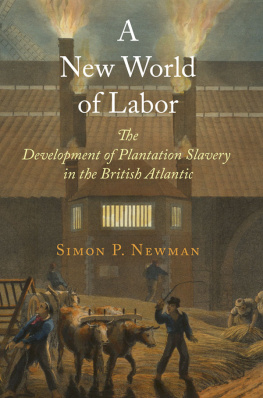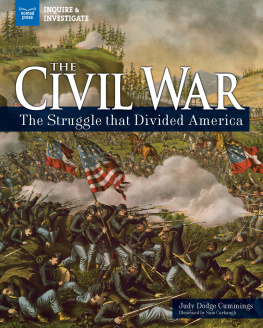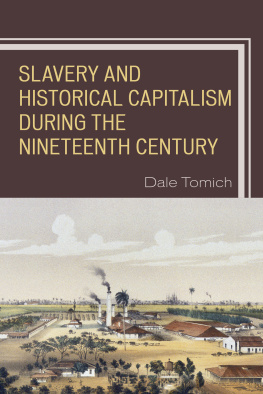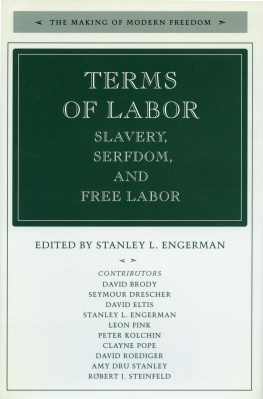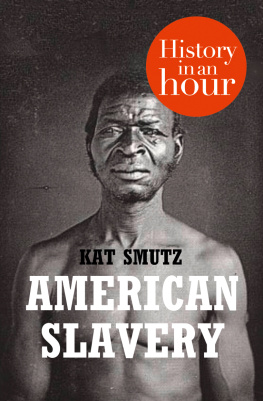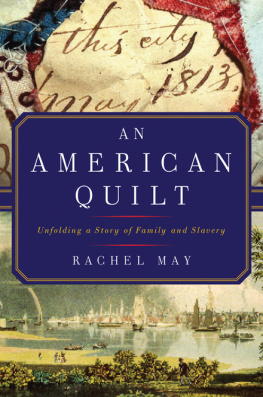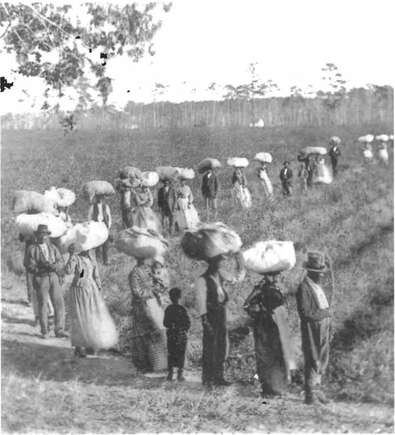THE MEANING OF SLAVERY IN THE NORTH
LABOR IN AMERICA
VOLUME 4
Labor in America
DAN GEORGAKAS, Series Editor
RACE, ETHNICITY, AND GENDER
IN EARLY TWENTIETH-CENTURY
AMERICAN SOCIALISM
edited by Sally M. Miller
WORK, RECREATION, AND CULTURE
Essays in American Labor History
edited by Martin H. Blatt
and Martha K. Norkunas
FROM THE KNIGHTS OF LABOR
TO THE NEW WORLD ORDER
Essays on Labor and Culture
by Paul Buhle
THE MEANING OF
SLAVERY IN THE NORTH
edited by David Roediger
and Martin H. Blatt
The Meaning of Slavery in the North
Edited by
David Roediger
and Martin H. Blatt
Copyright 1998 by David Roediger and Martin H. Blatt
All rights reserved
Library of Congress Cataloging-in-Publication Data
The meaning of Slavery in the North / edited by David Roediger and
Martin H. Blatt.
p. cm. (Garland reference library of social science; v.
1184. Labor in America; v. 4)
Collection of essays consists of substantially revised papers
delivered at the twelfth Lowell Conference on Industrial History,
June 3-5, 1993.
Includes bibliographical references and index.
Contents: Those valuable people, the Africans / Ronald Bailey
For the sake of commerce / Myron O. Stachiw Slavery in the North
/ Thomas H. O'Connor The meaning of slavery within a national
context / Larry K. Menna The northern churches and the moral
problem of slavery / John R. McKivigan Liberal religion and the
reform impulse in antebellum America / Carolyn Williams Needles,
pens, and petitions / Deborah Bingham Van Broekhoven Blackface
minstrelsy, vernacular comics, and the politics of slavery in the
North / Alexander Saxton.
ISBN 0-8153-2345-X (alk. paper)
1. SlaveryEconomic aspectsNortheastern StatesCongresses.
2. IndustrializationNortheastern StatesHistory19th century
Congresses. 3. Antislavery movementsNortheastern States
History19th centuryCongresses. 4. Northeastern StatesSocial
conditionsCongresses. I. Roediger, David R. II. Blatt, Martin
Henry, 1951- . III. Lowell Conference on Industrial History (12th:
1993) IV. Series: Garland reference library of social science;
v. 1184. V. Series: Garland reference library of social science.
Labor in America; v. 4.
E445.N5M43 1998
306.3'62dc21 97-25042
CIP
Cover photograph entitled Returning from the Cotton Fields in South Carolina used by permission of the New York Historical Society.
Publisher's Note
The publisher has gone to great lengths to ensure the quality of this book but points out that some imperfections from the original may be apparent .
Series Foreword
The grim shadow that slavery has cast over American history has obscured the reality of what textbooks used to casually refer to as "America's peculiar institution." Most Americans have chosen to think of slavery as a regional aberration rather than a national phenomenon. The essays in The Meaning of Slavery in the North do not seek to lessen the South's culpability regarding the horrors of slavery, but they insist that the so-called free states of the North were full partners in the viability of the slave society of the South.
The opening essays in this collection examine in detail how the economic interests of the industrial North complemented or directly intersected with those of the agrarian South. Even after Northern ships no longer engaged in the slave trade, there were substantial connections to the slave South involving textile production, the maritime industry, and interstate commerce of various kinds. In short, the slave system functioned as a national economic entity based in the South but not regionally restricted.
The concluding set of essays demonstrates that the notion of African racial inferiority generated by slavery was not a sectional prejudice, but a national consensus of the dominant European culture. Various secular and religious movements assailed this consensus with vigor Although successful to some degree in rallying moral outrage against slavery per se, they failed to significantly alter the racial views of white America.
Uniting the essays in terms of the labor movement is what they reveal about the attitudes of industrial workers and small farmers in the North regarding slave labor. These groups remained largely indifferent to the effects of slavery upon their economic well-being until the land beyond the Mississippi River became available for development. At the point free labor concluded that it could not compete in this new arena with slave labor working on behalf of the plantation aristocracy, economic self-interest necessitated that free labor became antislavery or at least against the expansion of slavery. The essays in The Meaning of Slavery in the North examine the failure of this economic conviction to be transformed into a political commitment of full citizenship for Americans of African origin. Like the various industrial and financial leaders of the North, free labor would have allowed the South its slaves as long as slave labor was confined to regional economic sectors involving cotton, tobacco, and sugar production.
Although the abolitionists and Radical Republicans were briefly able to set the national agenda after the assassination of Abraham Lincoln, their views never evolved into a permanent national ideology. The emotional dynamic of the decade following the Civil War was one of national healing. The major priority, North and South, became the political reunion of the European populations that had fought in the war. The reconstruction of Southern society, which would have involved full rights for Americans of African origin, was sacrificed to this end, most obviously in the electoral Compromise of 1877. One long-term consequence of genuine reconstruction was the probability that African Americans would have been invited to the North for the jobs ultimately allotted from 1880 to 1924 to millions of European immigrants. Given the emphasis on reunion, many of the antebellum tradeoffs and compromises reappeared in new garb, setting the stage for another century of racial exploitation.
By demonstrating that the institution of slavery and the psychology it generated were always national in character The Meaning of Slavery in the North illuminates much in subsequent and contemporary American history. These essays argue that the dominant national culture has always lacked the will to resolve the issues fomented by slavery in a manner consistent with the political contract embodied in the Declaration of Independence and the Bill of Rights. The obviously disadvantaged in this process have been African Americans. Less obviously the general American working class of the North and South has also been profoundly disadvantaged by directly or indirectly having to compete with an underpaid and otherwise economically exploited sector of national labor numbering in the millions. Part of the process of finally altering this political and economic syndrome involves identifying its tap roots in the first seventy years of the republic. The Meaning of Slavery in the North is a contribution to that process.
Dan Georgakas
Dedication
This book is dedicated to our children:
Emma Zula Munson Blatt
Brendan David Roediger
Donovan Joseph Roediger
We hope that they will grow up in a more just world.

